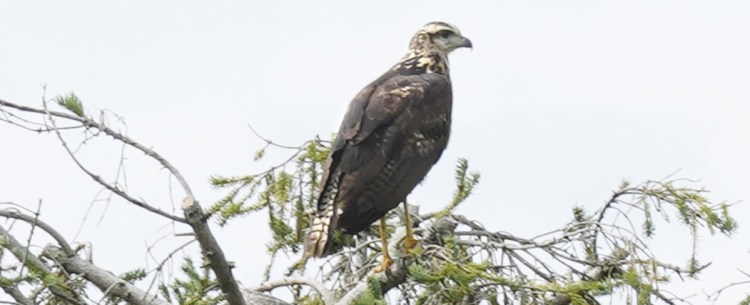The big birding news in Maine has been the reappearance of the great black hawk in Portland’s Deering Oaks Park. Since arriving on Nov. 29, hundreds of birders have come to see this rarity.
This hawk, native to Central and South America, is the first of its species on record in the United States. This is apparently the same bird that appeared in Texas in April and Biddeford in August.
Meanwhile, the northern finch irruptions continue. Lots of people are seeing evening grosbeaks at their feeders, sometimes 40 birds or more. Pine siskins are widespread. Common redpolls have not staged a massive incursion yet (fingers crossed), nor have pine grosbeaks.
An invasion by irruptive species requires two elements. First, the food resources on the breeding grounds have to be poor, forcing birds to come south for the winter. We know that condition is met. The second element is that the birds have to wander to southern parts where food is abundant. We might have excellent food availability but the irruptive birds may not venture our way.

A great black hawk perches in a tree in Deering Oaks Park in Portland on Nov. 29. The species is native to Central and South America. This appears to be the same bird that visited Biddeford in August.
In Maine, we are lucky to have the diminutive red-breasted nuthatch along with its larger cousin, the white-breasted nuthatch. The latter is more abundant overall. The red-breasted nuthatch is a denizen of coniferous forests and is subject to the same year-to-year fluctuations in food that influence finches. Red-breasted nuthatches are therefore an irruptive species.
In the southern half of Maine, red-breasted nuthatches may be scarce in some years and common in others. To our south, beyond their breeding range, red-breasteds are a winter treat. This winter is a major invasion year for them. A quick search of eBird records indicates these nuthatches have made it as far down as Florida and the Gulf states, with even a few in Mexico.
Red-breasted nuthatches in the winter tend to be alone or sometimes in small flocks. One or two may join a black-capped chickadee winter flock along with downy woodpeckers, tufted titmice and golden-crowned kinglets.
Red-breasted nuthatches feed on insects in the summer but rely heavily on conifer seeds the rest of the year. They are readily attracted to feeding stations. Black oil sunflower seeds, safflower seeds and peanuts are favorite foods.
Watch for hoarding behavior at your feeder if you have the pleasure of a red-breasted nuthatch or two. A nuthatch will come in to grab a seed and then fly away to cache it in the bark of a tree. Sometimes the larder is close by, but it may be quite distant.
About 20 years ago, I conducted a research project to examine the impact of supplemental food (sunflower seeds) on black-capped chickadees during the winter. I did the research at the northern end of Long Falls Dam Road on the east side of Flagstaff Lake. I chose this region because the winters at that altitude are severe and there are virtually no humans in that area during the winter. Therefore I knew I was the only person feeding the birds there.
I placed color bands in unique combinations on over 100 chickadees. I also caught 10 red-breasted nuthatches and gave them colored leg bracelets as well.
Since I could tell banded individuals apart by their color-band combinations, I could count the number of visits each bird made to the feeders. I found a seven-fold difference in feeding rate for the red-breasted nuthatches. Some used the feeders frequently while others, perhaps more adept at finding natural food, were more circumspect about visiting the feeders.
All 10 of the nuthatches survived the winter. Each was seen at least once during every week of the study, indicating high fidelity to the feeders. If you are fortunate enough to get red-breasted nuthatches at your feeders, chances are good they will stick around for a while, particularly in the winter.
Herb Wilson teaches ornithology and other biology courses at Colby College. He welcomes reader comments and questions at
whwilson@colby.edu
Copy the Story LinkSend questions/comments to the editors.



Success. Please wait for the page to reload. If the page does not reload within 5 seconds, please refresh the page.
Enter your email and password to access comments.
Hi, to comment on stories you must . This profile is in addition to your subscription and website login.
Already have a commenting profile? .
Invalid username/password.
Please check your email to confirm and complete your registration.
Only subscribers are eligible to post comments. Please subscribe or login first for digital access. Here’s why.
Use the form below to reset your password. When you've submitted your account email, we will send an email with a reset code.